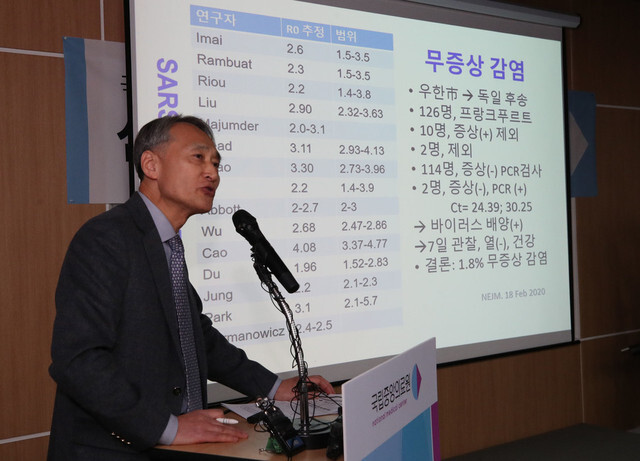hankyoreh
Links to other country sites 다른 나라 사이트 링크
[Interview] Outbreak can end only when 60% of S. Koreans develop immunity

“The novel coronavirus outbreak can only come to an end when around 60% of the South Korean population has developed immunity.”
Oh Myoung-don, a professor of infectious diseases at the Seoul National University (SNU) College of Medicine and chairperson of the central clinic committee for novel infectious diseases, insisted at a press conference on Mar. 23 that novel coronavirus prevention measures will need to include preparations for a long-term battle. To begin with, the committee is predicting a strong possibility that the disease will spread again during the second half of 2020.
“With the influenza of 1918 (Spanish flu), the first epidemic in the spring was famously followed by a second epidemic that fall that was five times larger,” Oh said.
“The reason the virus spread a second time is because many people hadn’t developed immunity,” he explained.
Presuming a reproductive number (the number of people directly infected while a single patient is capable of transmission) of 2.5 for the novel coronavirus, this would mean the South Korean outbreak would only be over once 60% of the population had developed immunity. Inoculation is one means of increasing immunity, but the development of a coronavirus vaccine is expected to take at least 12 months -- with no guarantee than a suitable vaccine will even be found. Without a vaccine, the only means of acquiring immunity would be through recovery after infection.
Establishing collective immunity would require removing the “deterrence policies” of marshalling staff and resources to identify cases where the virus has been introduced in South Korea, as with the full-scale testing of arriving international passengers. But this would lead to inevitable risks of the virus spreading. This dilemma forces a choice between carrying on with the deterrence policies and “relaxation policies” such as reopening schools so that people can return to daily life. Since either option inevitably means a long-term battle, careful preparations for a pandemic will be needed.
Worries of coronavirus spread if schools reopen next month
“If we reopen schools next month, the coronavirus will spread,” Oh predicted. “It’s obvious that there is going to be chaos if experts and the teachers who are most knowledgeable about the classroom environment don’t put their heads together and make preparations so that when confirmed cases are found, only the classrooms in question are closed down.”
The central clinic committee also pleaded for the public not to be excessively fearful of the virus.
“Eighty percent of those infected experience only mild symptoms, and even without treatment they present no cause for concern,” Oh said.
“Even when people develop pneumonia, they tend to recover if they are hospitalized and receive effective oxygenation treatment,” he explained.
At the same time, Oh stressed that necessary medical resources will need to be acquired for patients with severe cases in anticipation of an even larger outbreak this fall.
Another urgent need is the acquisition of data on treatment times for severe cases and other areas based on clinic information for diagnosed patients. The central clinical committee announced that it had established an online information management system (eCRF) where hospitals treating confirmed patients can input and access clinic information.
Chung Ki-hyun, director of the National Medical Center, explained, “Support measures will be needed for delays in inputting information due to the large workloads of medical staff in Daegu and North Gyeongsang Province, who are currently treating 85% of diagnosed patients.”
By Park Hyun-jung, staff reporter
Please direct comments or questions to [english@hani.co.kr]

Editorial・opinion
![[Column] Samsung’s ‘lost decade’ and Lee Jae-yong’s mismatched chopsticks [Column] Samsung’s ‘lost decade’ and Lee Jae-yong’s mismatched chopsticks](https://flexible.img.hani.co.kr/flexible/normal/500/300/imgdb/original/2024/0512/3017154788490114.jpg) [Column] Samsung’s ‘lost decade’ and Lee Jae-yong’s mismatched chopsticks
[Column] Samsung’s ‘lost decade’ and Lee Jae-yong’s mismatched chopsticks![[Correspondent’s column] The real reason the US is worried about Chinese ‘overcapacity’ [Correspondent’s column] The real reason the US is worried about Chinese ‘overcapacity’](https://flexible.img.hani.co.kr/flexible/normal/500/300/imgdb/original/2024/0510/5217153290112576.jpg) [Correspondent’s column] The real reason the US is worried about Chinese ‘overcapacity’
[Correspondent’s column] The real reason the US is worried about Chinese ‘overcapacity’- [Editorial] Yoon’s gesture at communication only highlights his reluctance to change
- [Editorial] Perilous stakes of Trump’s rhetoric around US troop pullout from Korea
- [Guest essay] Preventing Korean Peninsula from becoming front line of new cold war
- [Column] The state is back — but is it in business?
- [Column] Life on our Trisolaris
- [Editorial] Penalties for airing allegations against Korea’s first lady endanger free press
- [Editorial] Yoon must halt procurement of SM-3 interceptor missiles
- [Guest essay] Maybe Korea’s rapid population decline is an opportunity, not a crisis
Most viewed articles
- 1[Correspondent’s column] The real reason the US is worried about Chinese ‘overcapacity’
- 2[Book review] Who said Asians can’t make some good trouble?
- 3[Column] Samsung’s ‘lost decade’ and Lee Jae-yong’s mismatched chopsticks
- 4Behind bellicose bluster, N. Korea is turning airfields into greenhouse farms
- 5Seoul’s plan to adopt SM-3 missiles is like wanting a sledgehammer to catch a fly
- 6[Editorial] Human trafficking in S. Korea
- 7Report documents instances of lonely deaths in South Korean society
- 8[Column] “Hoesik” as ritual of hierarchical obedience
- 9[Editorial] Penalties for airing allegations against Korea’s first lady endanger free press
- 10Yoon’s broken-compass diplomacy is steering Korea into serving US, Japanese interests